Content may contain affiliate links. When you shop the links, I receive a small commission at no cost to you. Thank you for supporting my small business.
Searching for the perfect white paint color? Sherwin Williams Pure White (SW 7005) is one of the most versatile white paints for walls, trim, cabinets, and exteriors. With a soft, warm look that pairs beautifully with both cool and warm tones, it’s a favorite among designers and homeowners alike.
Picking the right white paint can feel overwhelming—too warm, and it looks yellow; too cool, and it feels stark. But don’t worry! I’ll walk you through exactly when and where to use Pure White so you can make the right choice for your home.
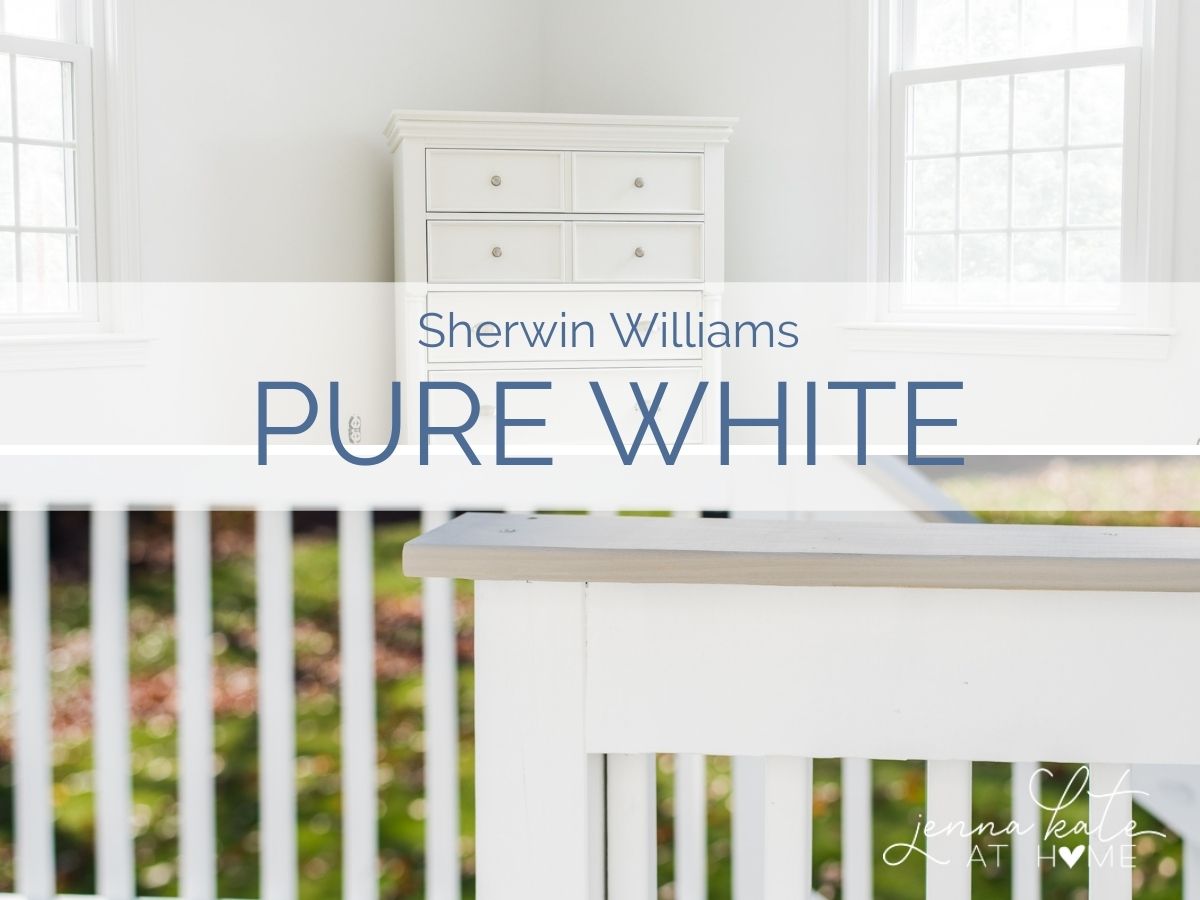
Quick Look at Sherwin Williams Pure White
| Feature | Details |
|---|
| LRV | 84 (soft, bright white) |
| Undertones | Subtle warmth (tiny drop of yellow) + a touch of gray |
| Best for | Trim, doors, cabinets, walls, exteriors |
| Pairs well with | Cool colors (blues, grays, greens) and warm colors (greige, beige, tan) |
| Similar to | SW Extra White (brighter), SW Alabaster (warmer), SW Snowbound (taupe undertone) |
If you’re looking for a versatile bright white that looks soft yet works with both warm and cool colors, SW Pure White is an excellent choice. In fact, since we remodeled our kitchen a few years ago, we’ve slowly been repainting all our trim and interior doors this color (which were previously BM Decorator’s White and then SW Extra White).
Is Pure White A Bright White?
While pure white is, as the name suggests, quite white, it does not feel cold and stark and only has the smallest drop of yellow to warm it up. This makes it a great choice for walls, trims, cabinets, and exterior siding.
It has an LRV of is 84, meaning it reflects a lot of light. This makes it a soft white color, and not an in-your-face ultra-bright white.
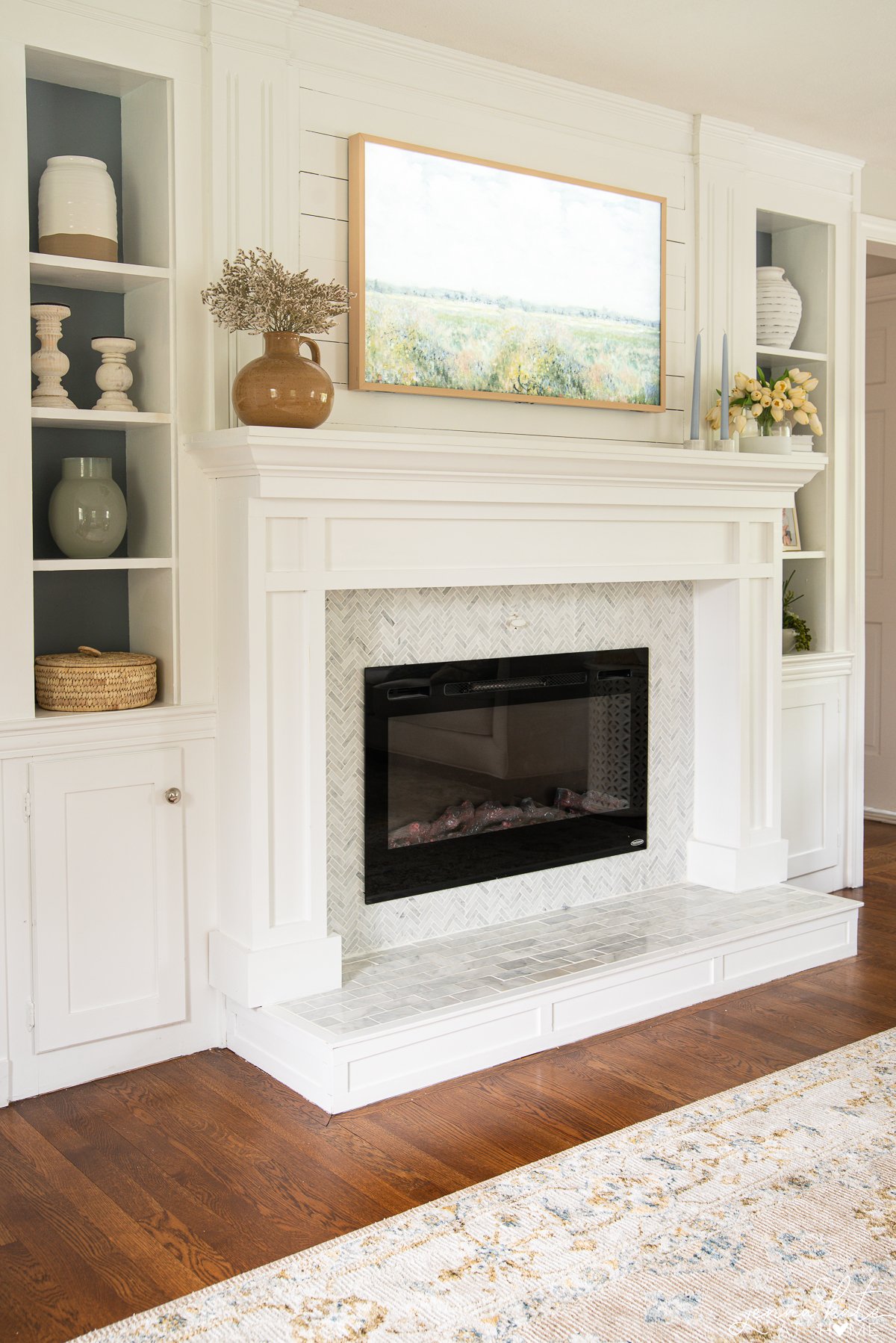
If you want to learn more about LRV and how it’s SO important when choosing paint colors, I’ve written a whole blog post about it.
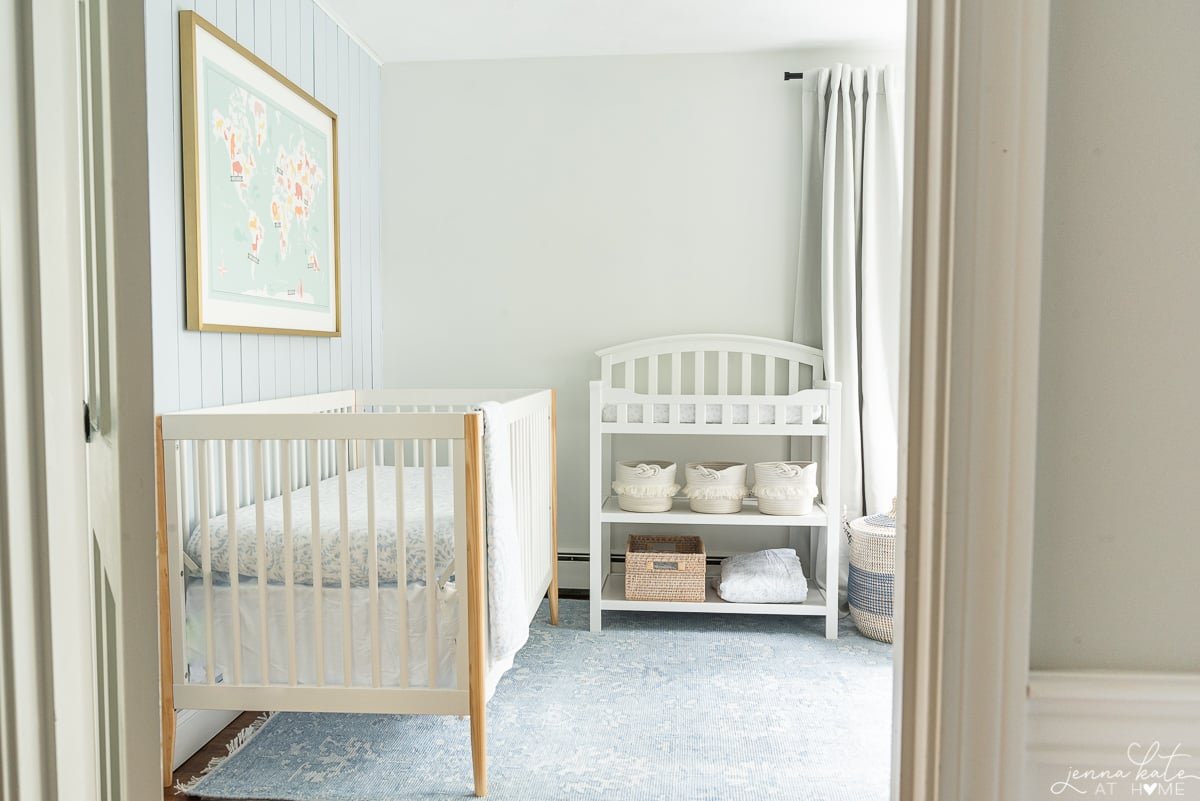
Want a warmer white? Check out my Sherwin Williams Alabaster Review.
Sherwin Williams Pure White Undertones: Warm or Cool?
Pure White has the slightest hint of warmth (touch of yellow) and the tiniest touch of gray to offset the warmth.
This slight softness makes it a great option for any design style. It pairs well with cool-toned colors such as blues, greens, and grays and with warmer colors like greige, beige, and tan paint colors. This is what makes it such a versatile shade of white.
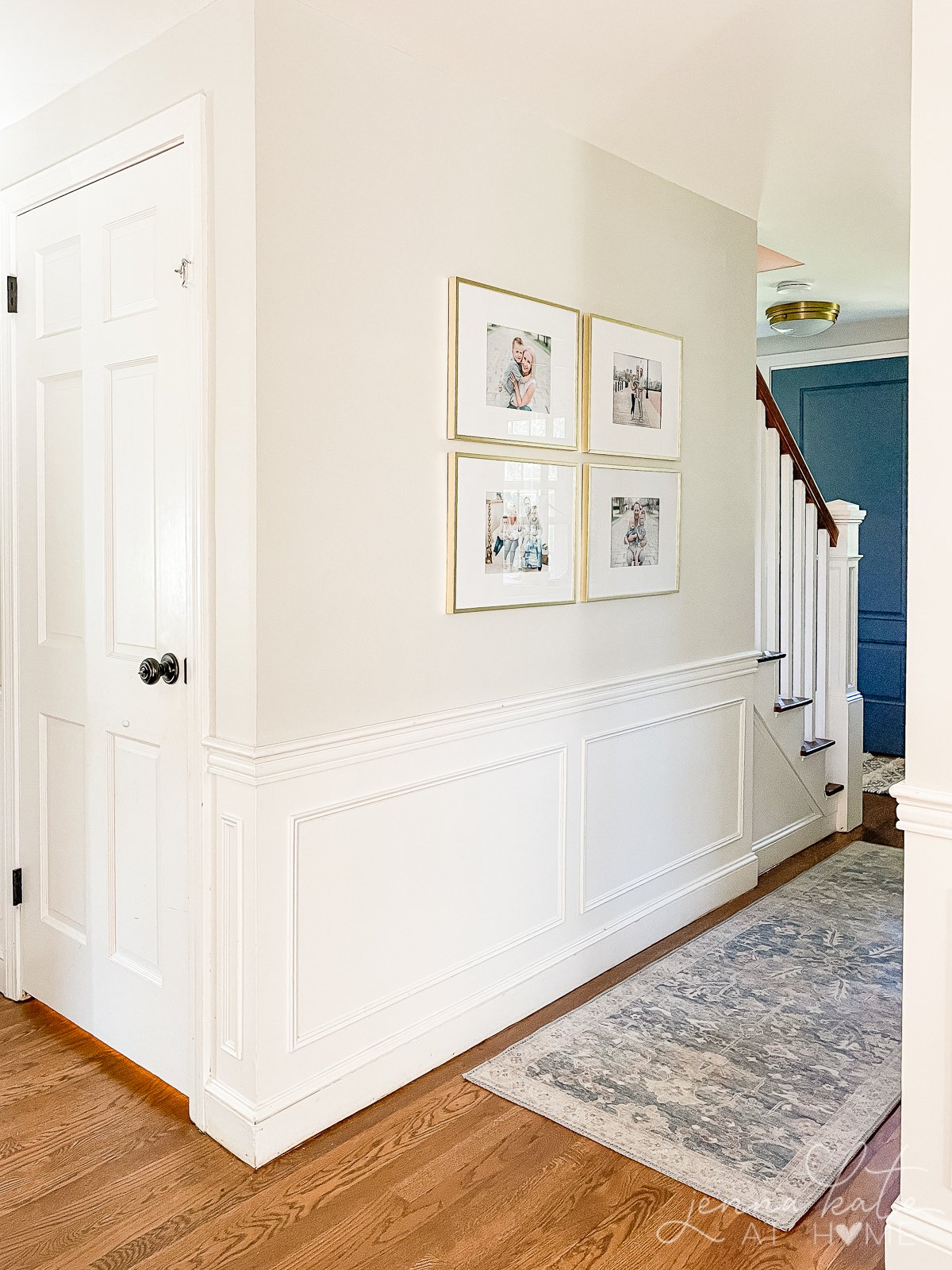
Where to Use SW Pure White: Walls, Trim & More
Pure White as a trim and door color will work in any room of your home, with any exposure. It doesn’t matter whether you have warm south-facing light, only morning light, afternoon light or gray northern light. It’s an excellent, versatile choice for a soft warm white.
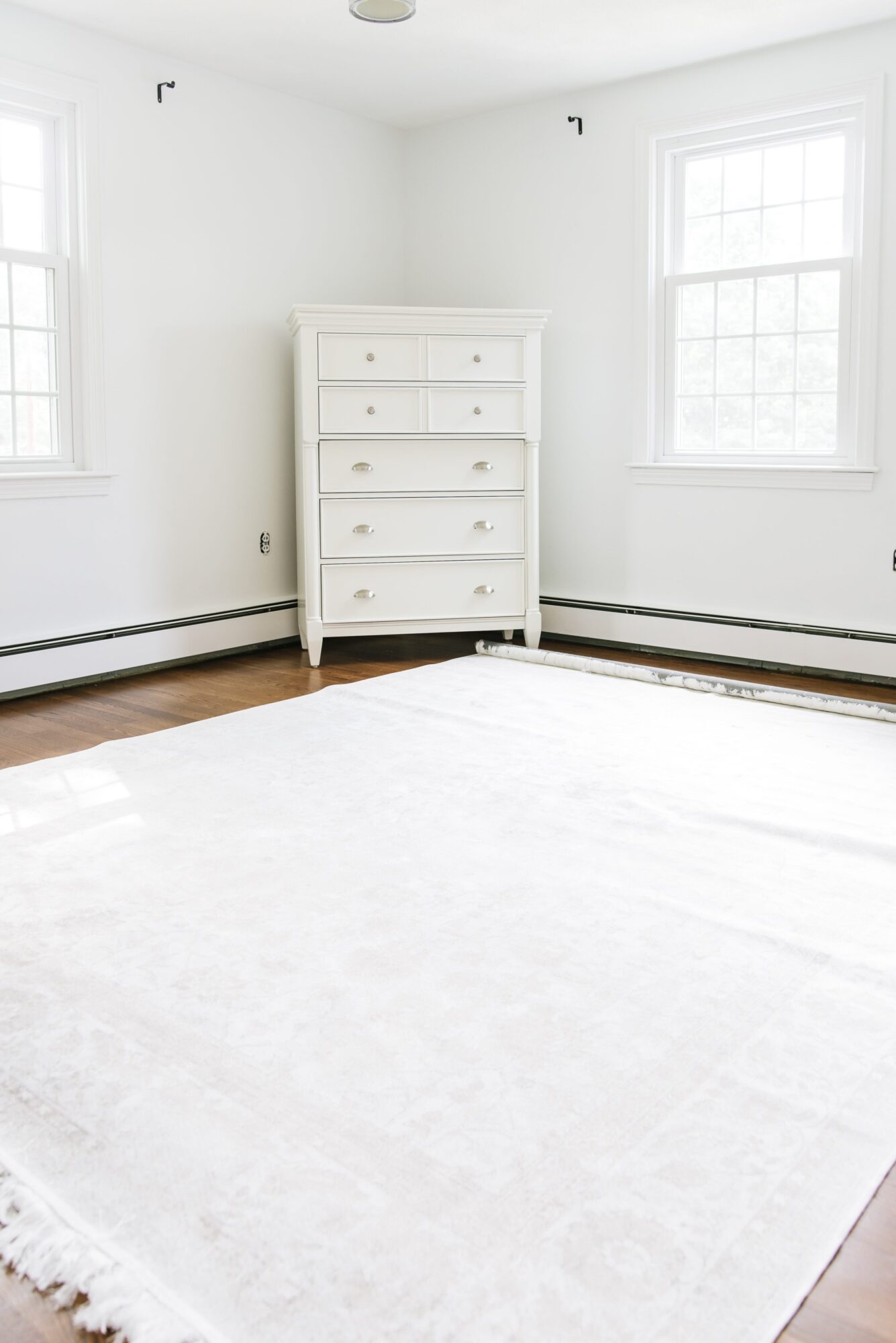
However, for walls in a room that gets cool light all day long, Pure White may lean more into its gray undertone, but it will still appear as a soft white. I personally don’t love how it looks on the walls on this east facing bedroom and would prefer something a smidge warmer without that slight gray cast.
On the other hand, a south facing room or rooms with a lot of warm western afternoon light will see the warmer undertone become a lot more apparent. Below, you can see how dramatically different it looks in the morning in my powder room (west facing) versus the afternoon when it’s getting warm sunlight.
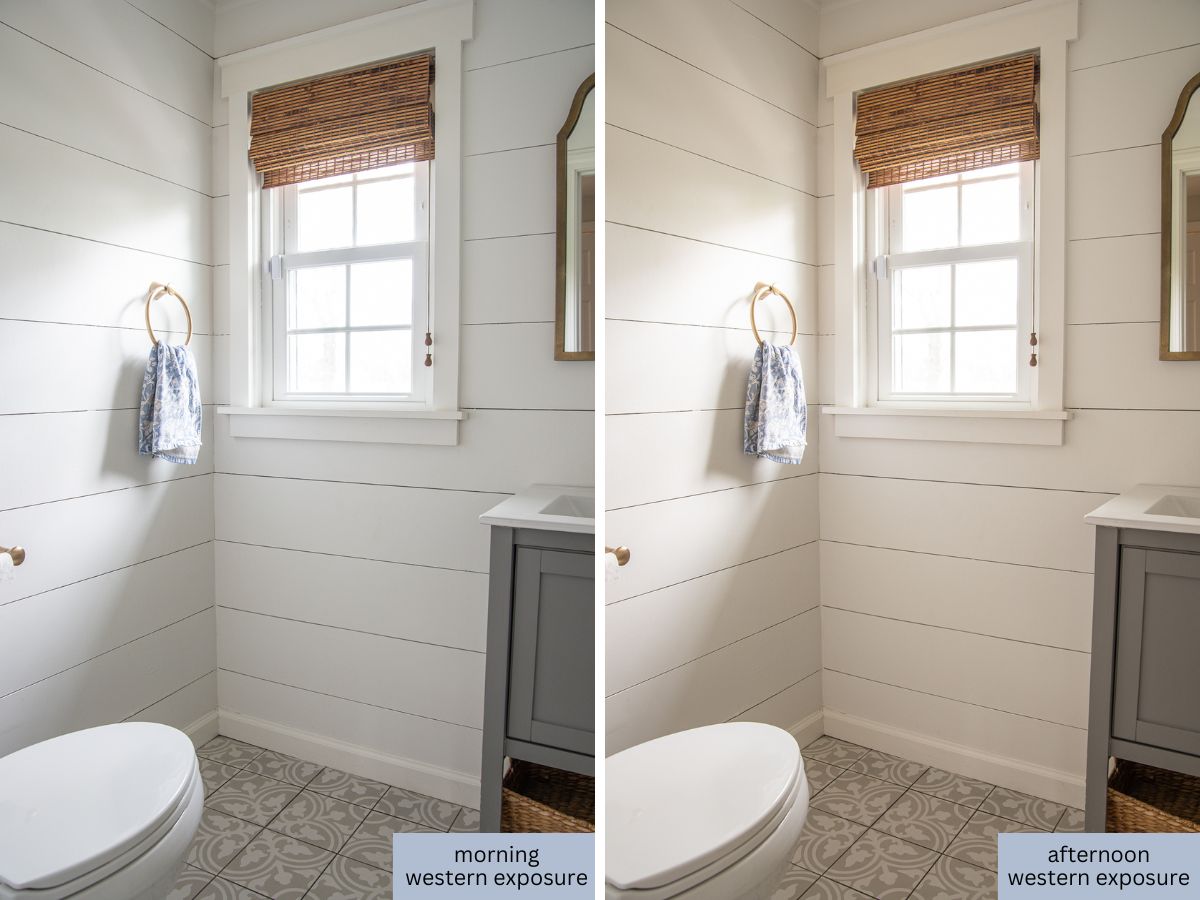
We also used Pure White to spray our deck. It ties in perfectly with our bright white siding, so I know it would also be a great color if you were choosing to paint the exterior of your house a bright white.
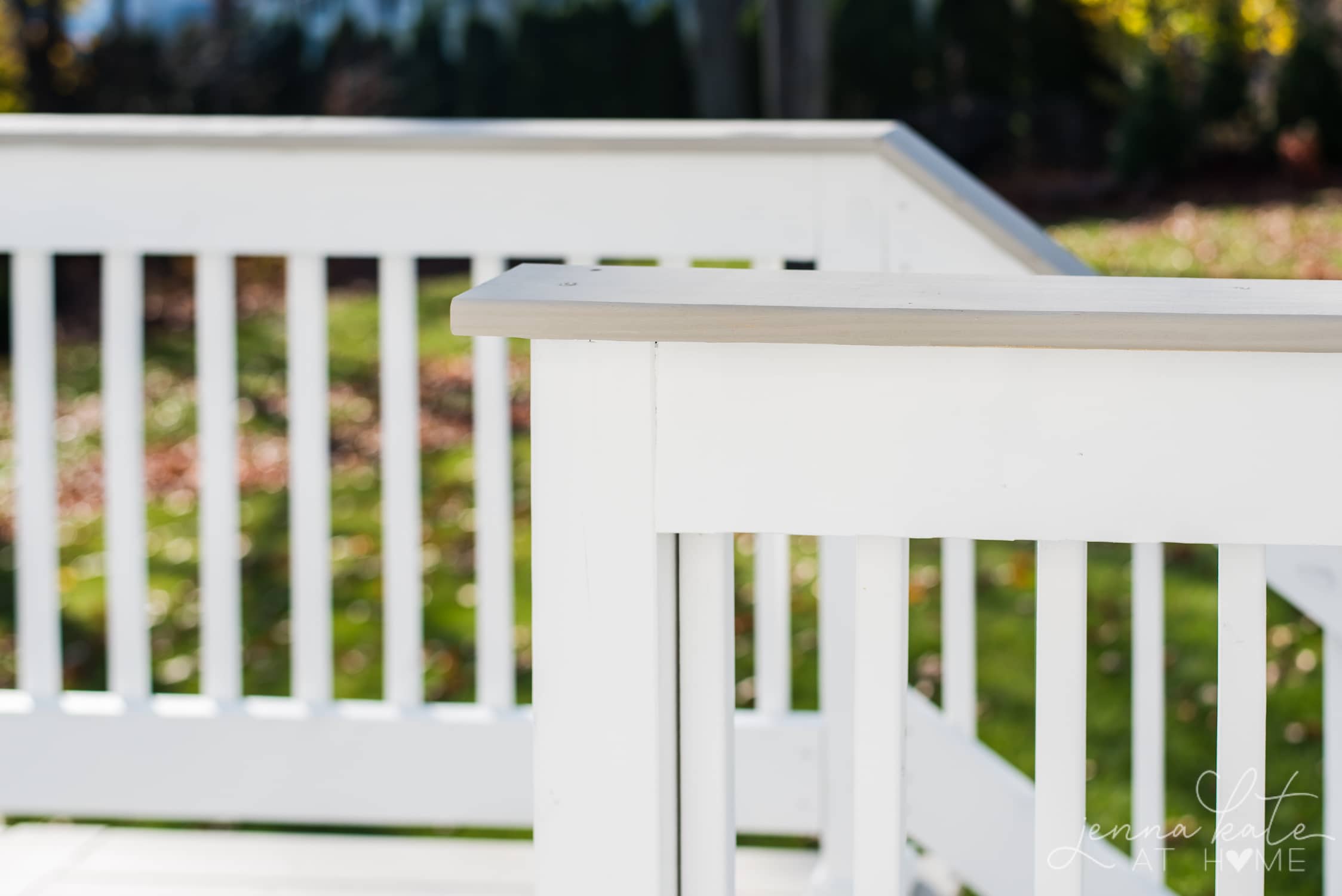
Recommended Paint Sheens for SW Pure White
The sheen of paint used on walls, trim, and ceilings can make a difference in the final look of the space.
Ceilings: Flat (hides imperfections, non-reflective)
Walls: Matte or eggshell (soft, easy to maintain)
Trim & Doors: Satin (for a modern look) or semi-gloss (durable & easy to clean).
Pair your white walls with the right trim color! My Best White Trim Paint Colors guide will help.
SW Pure White on Kitchen Cabinets
If you’re wondering how this particular color works on kitchen cabinets, the photo below is a great example at how well it works not only on cabinets, but in the whole kitchen—walls, ceiling, and trim! It’s a great option if you’re looking for a timeless white for your kitchen.
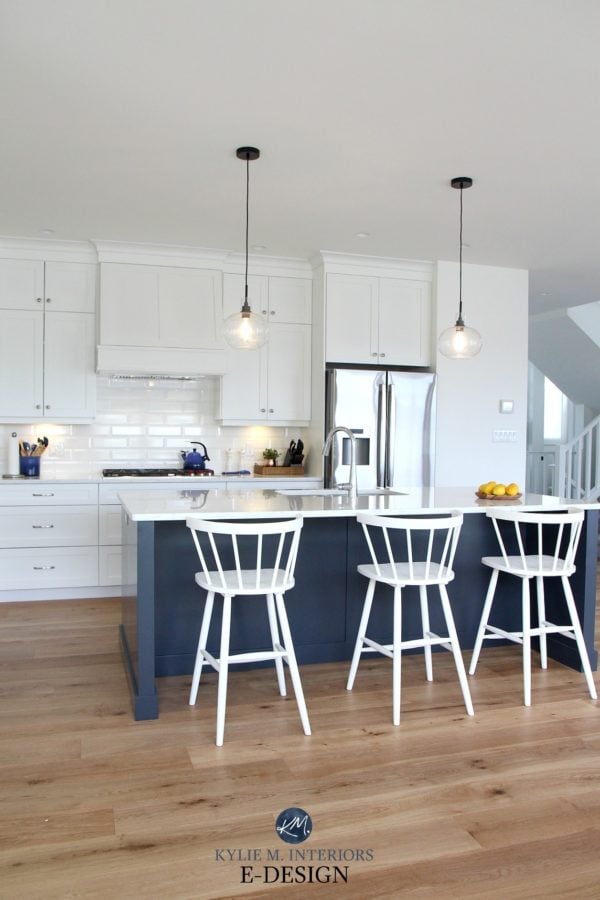
Pure White vs. Extra White: Which One Should You Choose?
Now, let’s compare Pure White to other popular Sherwin Williams white shades.
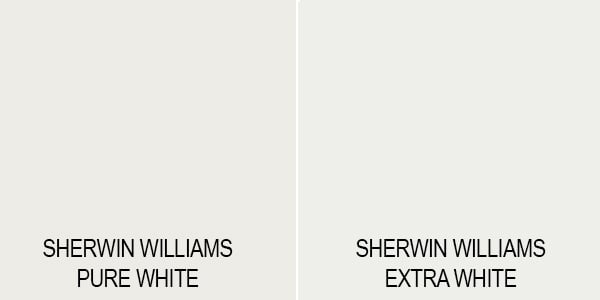
Sherwin Williams Extra White (SW 7006) is a brighter, crisper white with a higher LRV of 86. It doesn’t have the softness that Pure White has and can appear starker in certain lighting (especially East facing rooms or those with Northern exposure). It has a tendency to flash a little blue, so I usually prefer to use it alongside other cool colors.
| Feature | Pure White | Extra White |
|---|---|---|
| LRV | 84 | 86 (brighter) |
| Undertones | Soft warm white | Cooler, can look slightly blue |
| Best For | Versatile, works with warm & cool tones | Best with cooler color palettes |
| Feels Like | Soft, warm white | Bright, crisp white |
If you place Pure White alongside Extra White, it will immediately look a bit dirty, thanks to that little drop of black that gives it the gray undertone.
Extra White is one of those really bright whites, that when placed next to another white, instantly makes them look dingy.
I would not use these two whites together. If you are choosing between the two for doors and trim, Extra White is a really bright, crisp, almost stark white that can turn a little bit blue in cool light. Pure White is less bright and has barely any tendency to show its undertones, making it a great choice.
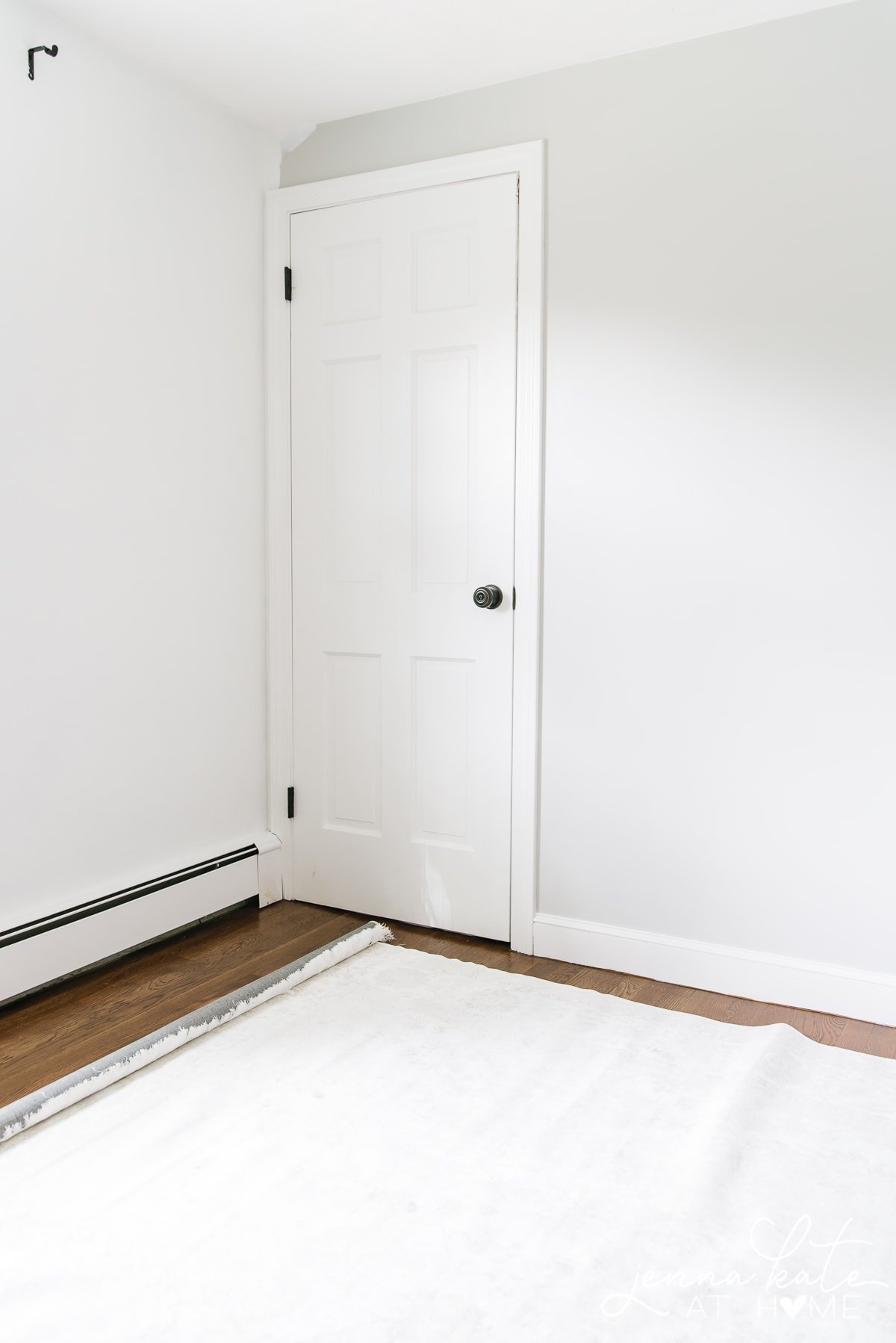
Pure White vs Alabaster
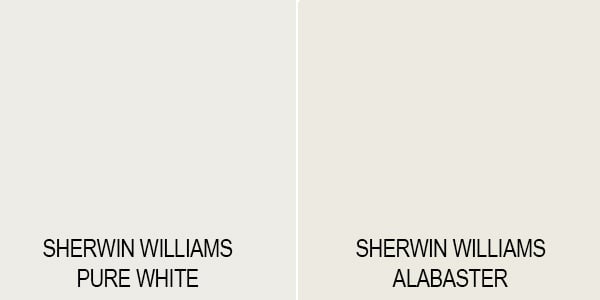
Sherwin Williams Alabaster (SW 7008) is a warmer white with both a yellow undertone and some gray to help soften it up. It has an LRV of 82, making it a slightly darker option than Pure White. Alabaster verges on feeling like an off-white.
| Feature | Pure White | Alabaster |
|---|
| LRV | 84 | 82 (darker) |
| Undertones | Subtle warmth + touch of gray | Warm with a stronger yellow undertone |
| Best For | Walls, trim, cabinets, exteriors | Cozy walls, off-white look |
While it’s a popular color for walls, trims, and cabinets, it’s not what you would want to choose for a traditional “white” trim or cabinet color.
Pure White vs Snowbound
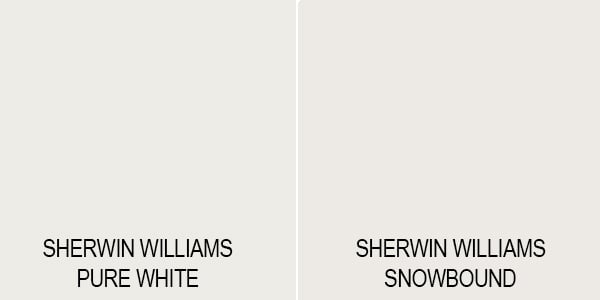
If you’re looking for a traditional “white” white, Sherwin Williams Snowbound most likely is not the color for you. It’s not a true white and has warmer undertones that make it lean closer to the off-white color range, despite its LRV of 83.
Snowbound has a taupe undertone that can look quite pink in certain lights, while in southern exposures it can even look a bit creamy.
| LRV (Light Reflectance Value) | 84 (soft bright white) | 83 (slightly darker) |
| Undertones | Slight warmth + touch of gray | Taupe undertone, can appear pink in certain lights |
| Best For | Walls, trim, cabinets, exteriors | Warm, slightly taupe-toned walls; can work for trim in some cases |
| Feels Like | Soft, warm white | Can lean warm or pink, depending on lighting |
If you’re looking for a soft, warmer color for your walls, Snowbound may not be a bad choice, but if you’re looking for a nice bright white for your trim and doors, this is probably not the color you’re looking for.
Pure White vs High Reflective White
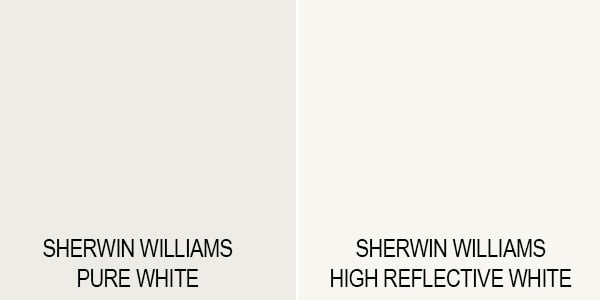
High Reflective White is Sherwin Williams’ whitest white, and it’s almost a completely true white with no visible undertones. If you want a really really bright white that is neutral (no warmth, no coolness) then High Reflective White is an excellent choice.
High Reflective White is actually the base white used to make other paint colors so it has no tint added to it.
| LRV (Light Reflectance Value) | 84 (soft bright white) | 93 (very bright, almost true white) |
| Undertones | Slight warmth + touch of gray | No visible undertones, very neutral |
| Best For | Walls, trim, cabinets, exteriors | Ultra-bright spaces, modern homes, trim, ceilings |
| Feels Like | Soft, warm white | Crisp, clean, very bright white |
Compared to High Reflective White, Pure White will look a lot softer, and depending on the light, you’ll notice either the warmth or that touch of gray. Of course, that’s only when they are compared side by side.
Don’t Forget…
Don’t forget – no matter what you’ve read or photos you’ve seen online, it’s really important to sample paint colors in your home before committing!
Samplize provides real paint samples that are easy to move around your home, and cheaper than buying a gazillion paint pots! It’s the only way I buy paint samples.
What Colors Compliment SW Pure White
SW Pure White is very versatile and works with both cool and warm color schemes. Benjamin Moore Silver Satin is one of my favorites to pair with SW Pure White because of the contrast. However, any color can easily be paired with SW Pure White because of it’s versatility.
Basically, it works with any paint color and that’s why it’s so loved. So whether your home is full of grays and blues or you lean warmer with beiges or tans, Pure White will work.
Is Pure White Good in a Dark Room?
It depends. If you are looking for a nice bright white for trim that’s not stark, then it’s a great choice. If you’re looking for a white paint color to brighten up a dark room, other shades of white would be a better choice as a paint color for a dark room.
Final Thoughts
Sherwin Williams Pure White is one of the most versatile white paint colors available—bright yet soft, warm but balanced. It works beautifully on walls, trim, cabinets, and exteriors, making it a go-to choice for many homes.
Still deciding on the perfect white? Here’s what to do next:
1️⃣ Save this post to Pinterest for easy reference!
2️⃣ Order a sample and test it in different lighting conditions.
3️⃣ Drop a comment below—I’d love to hear which white you’re leaning toward!
💡 Pro Tip: Always test a sample on your wall before committing—white paint can look completely different depending on the lighting in your home!

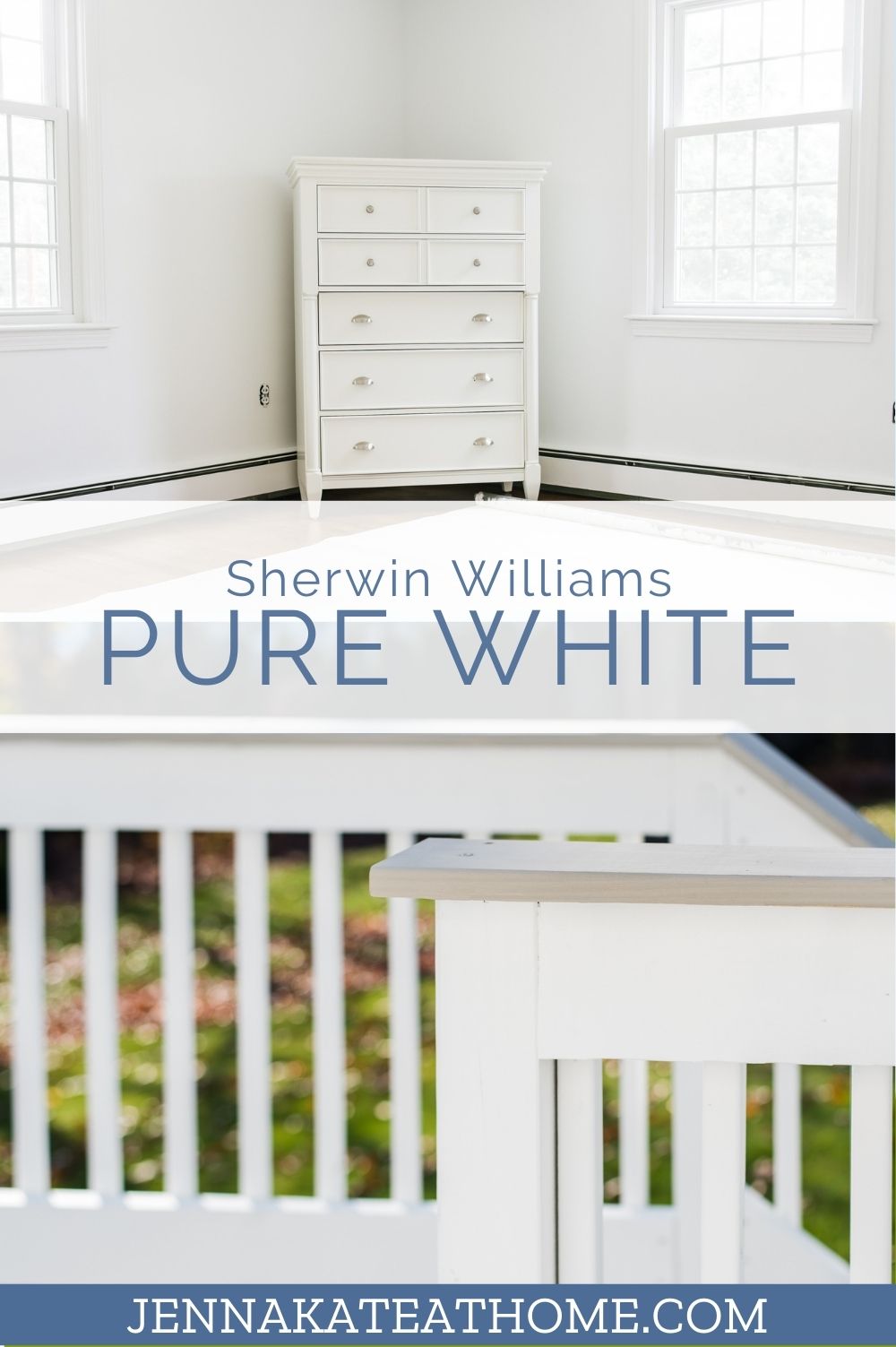
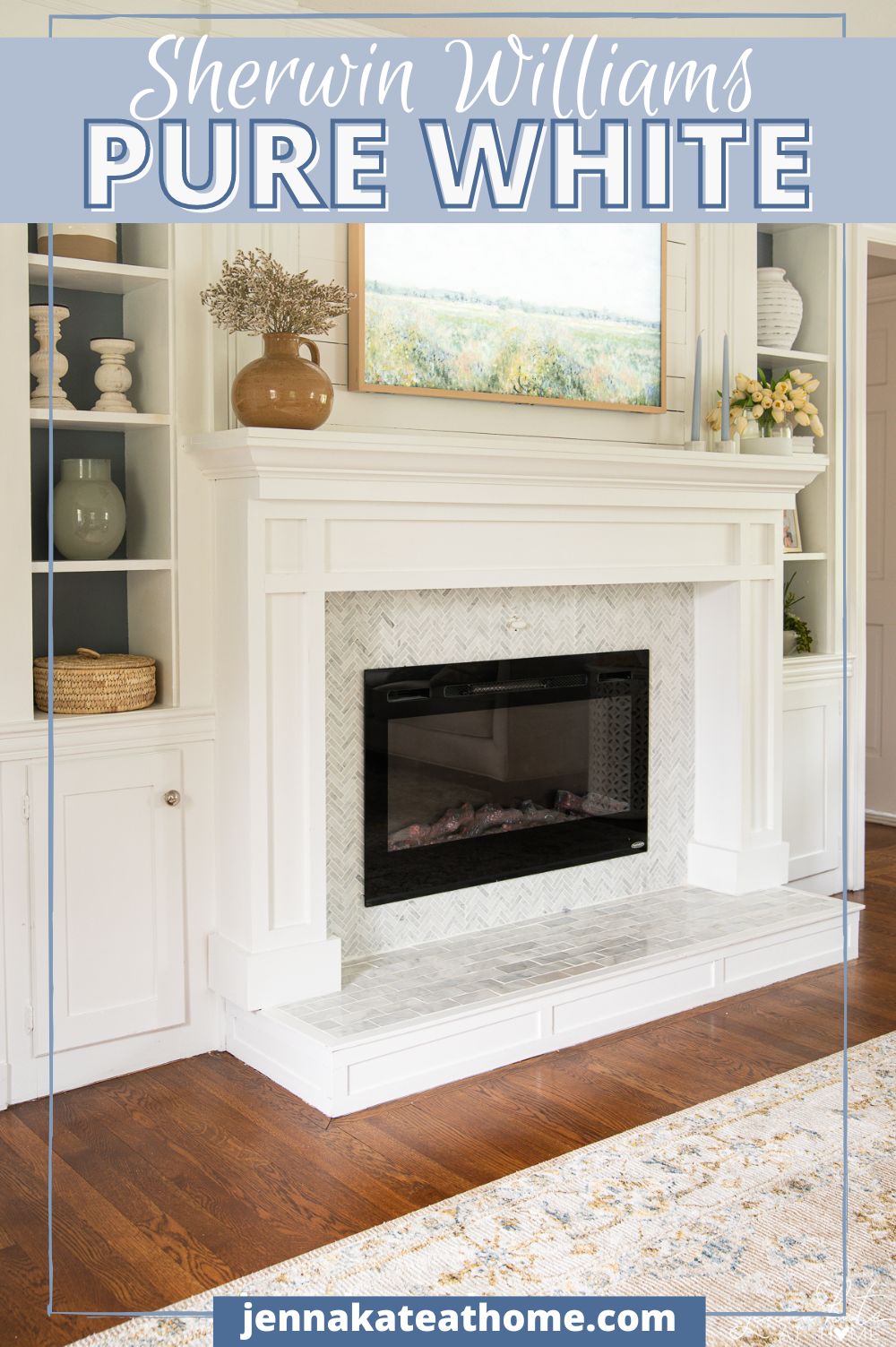
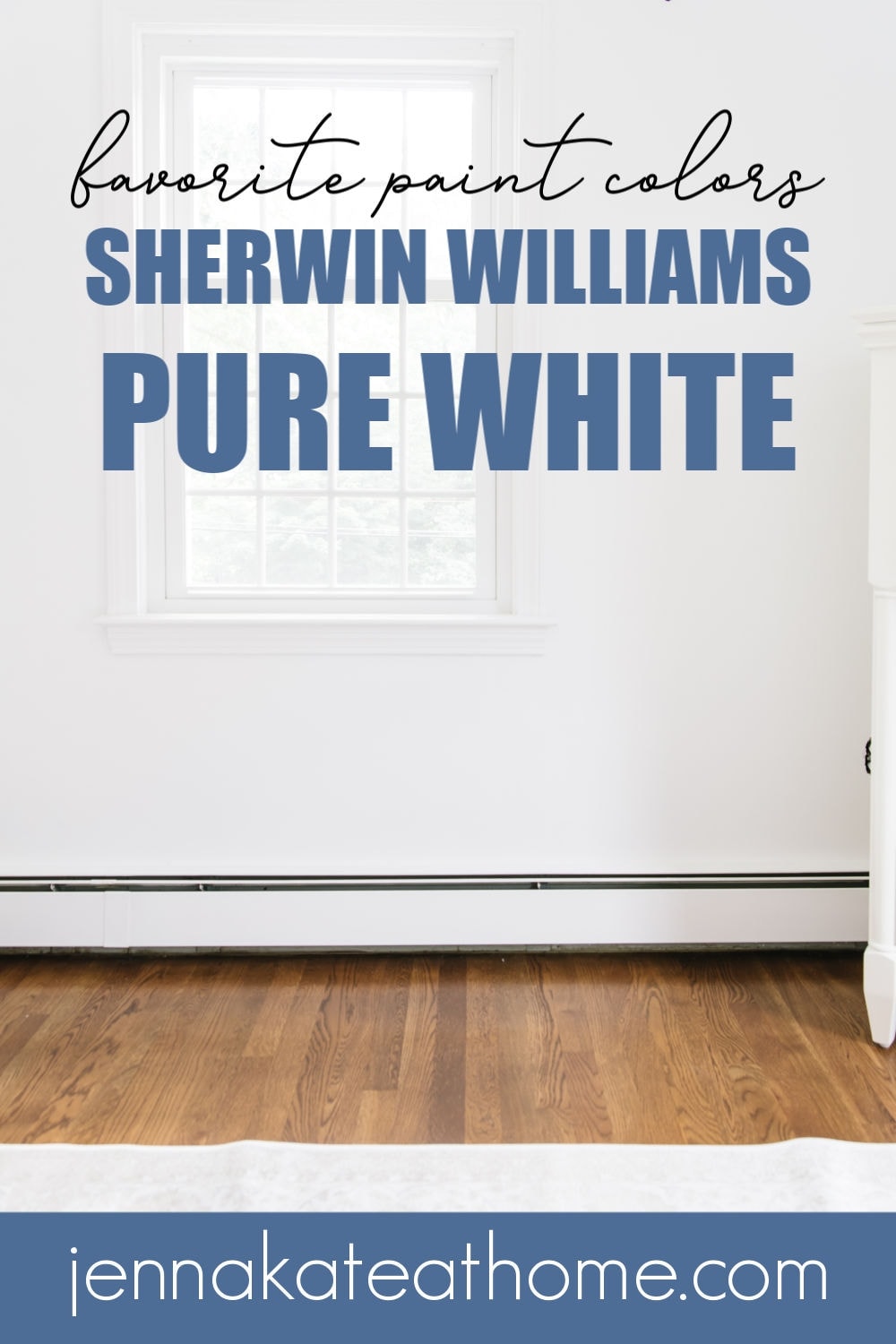
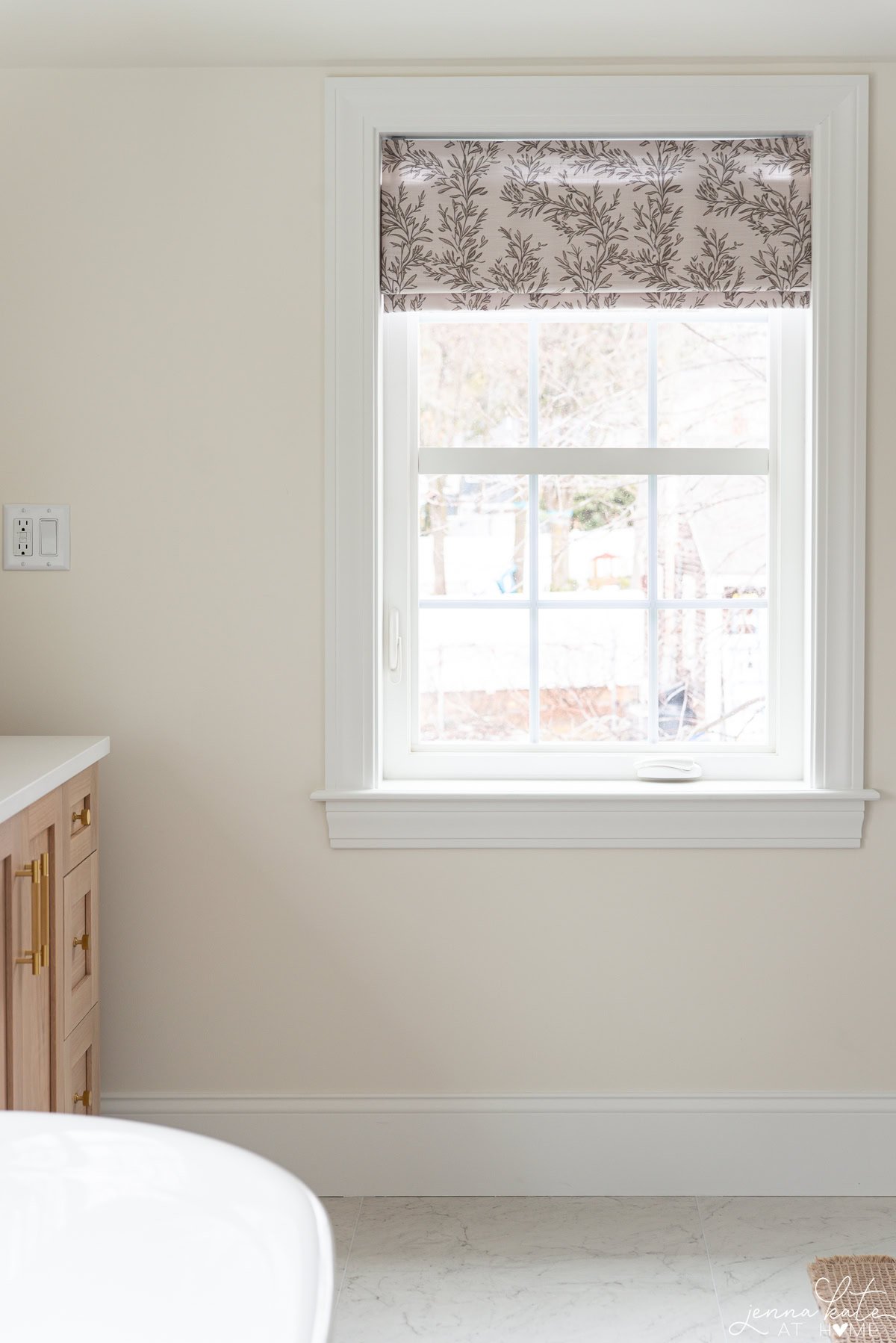
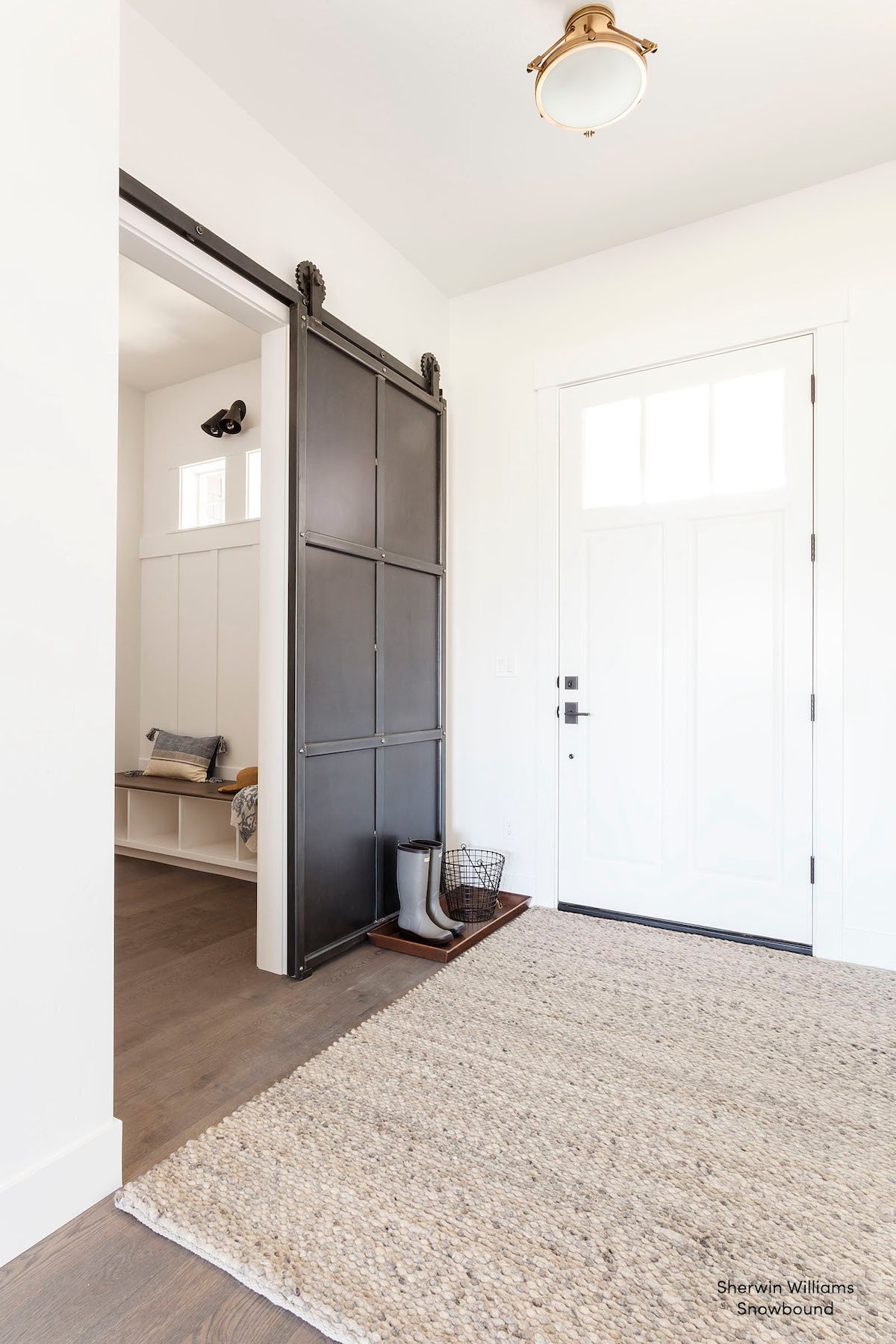
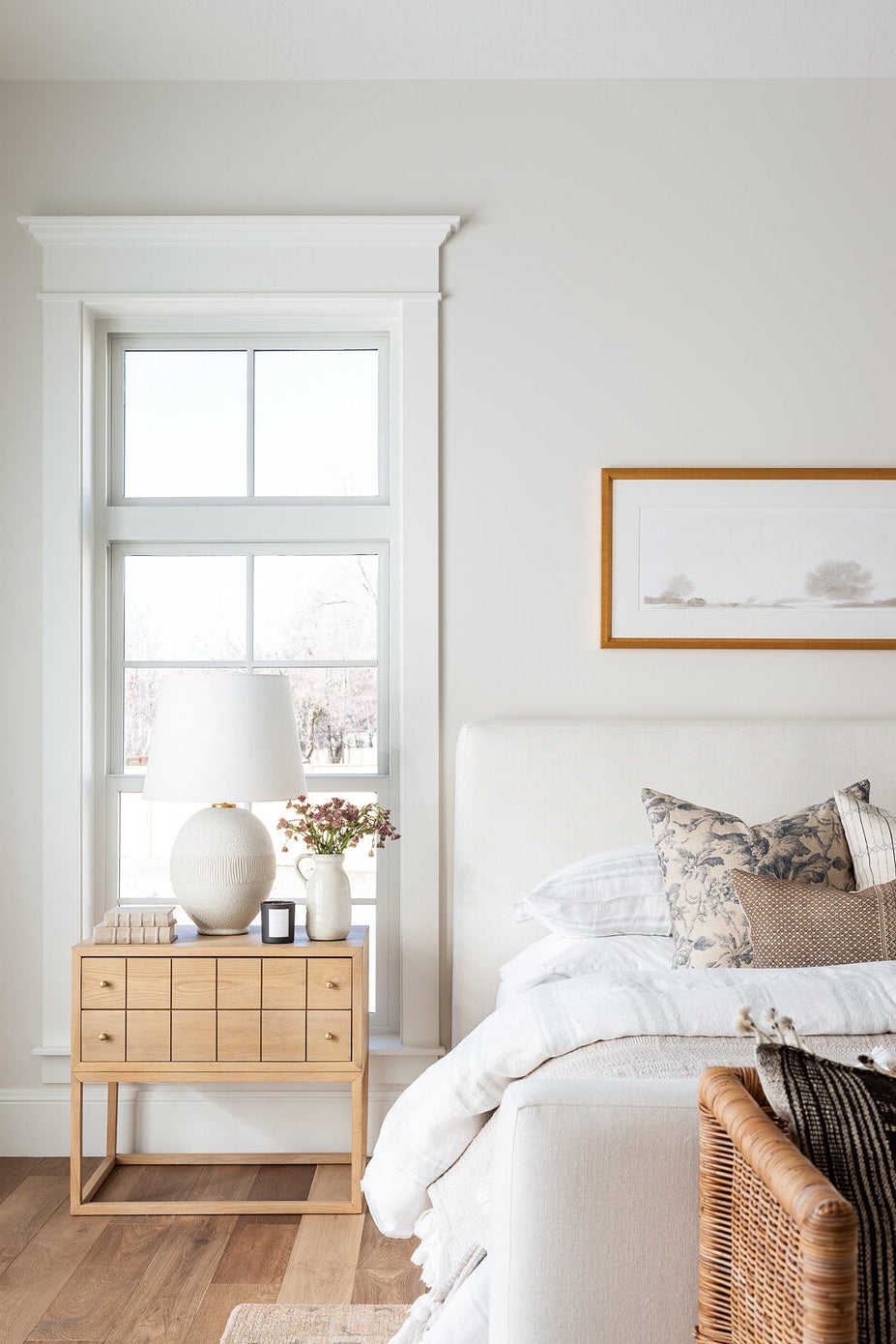
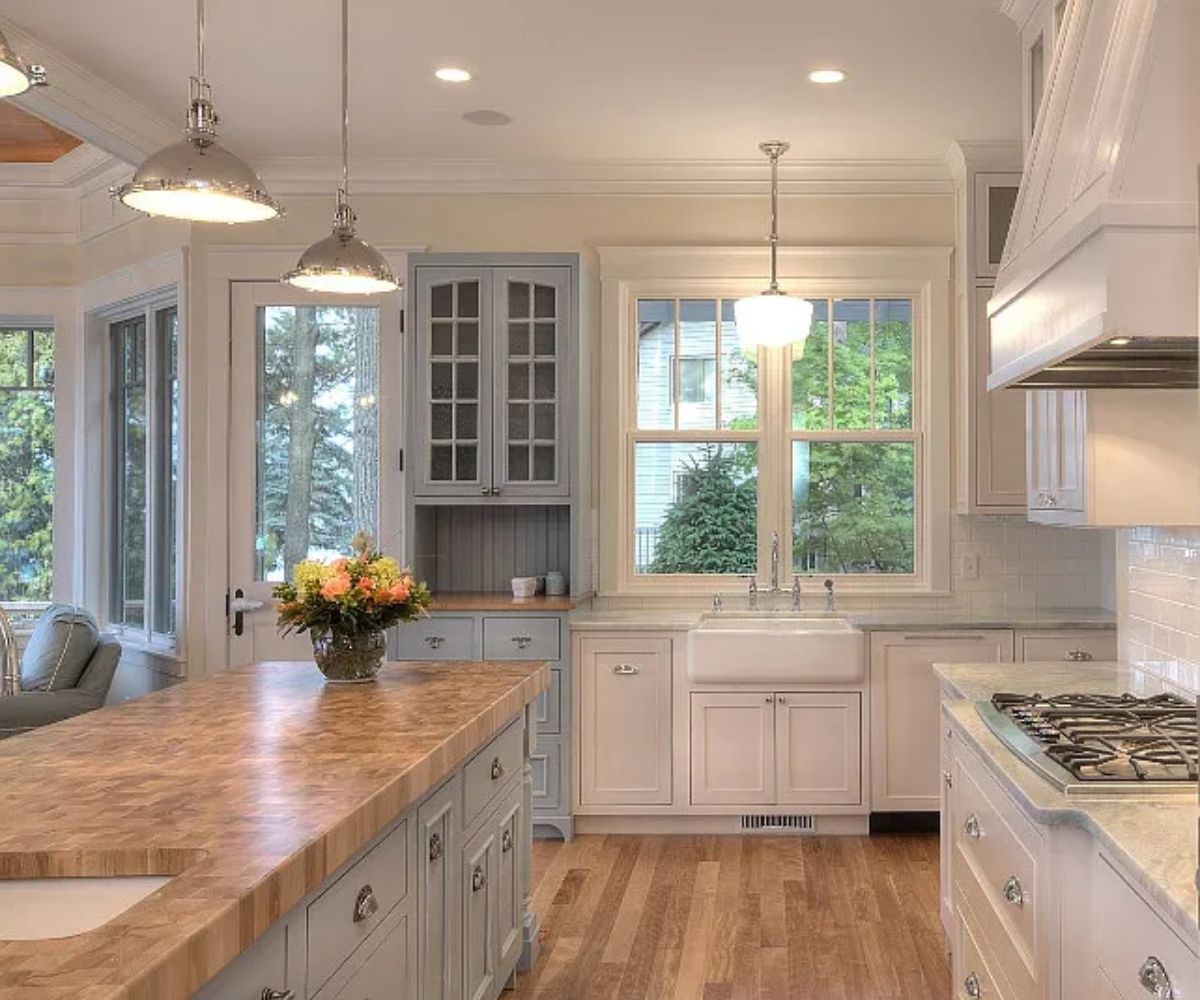
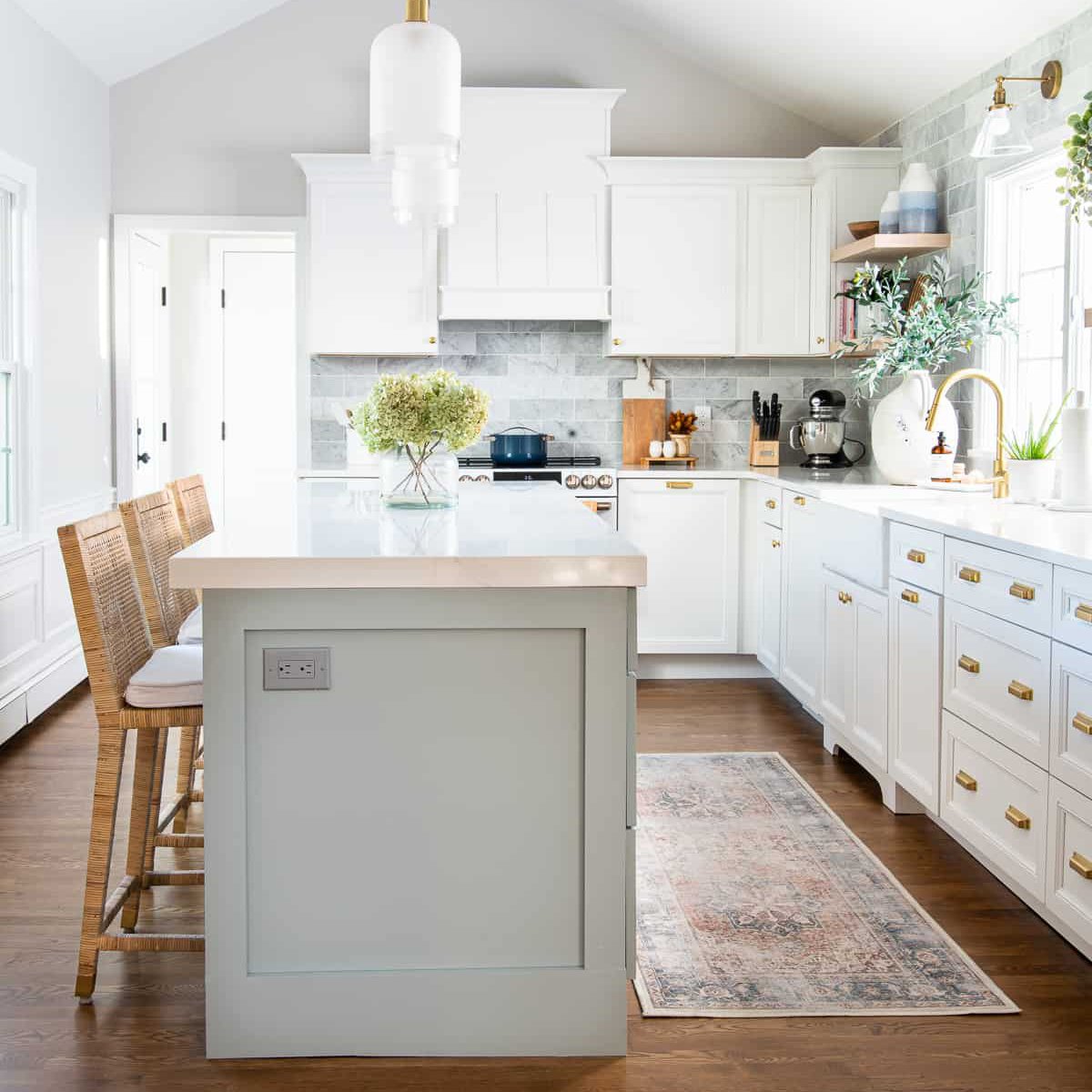
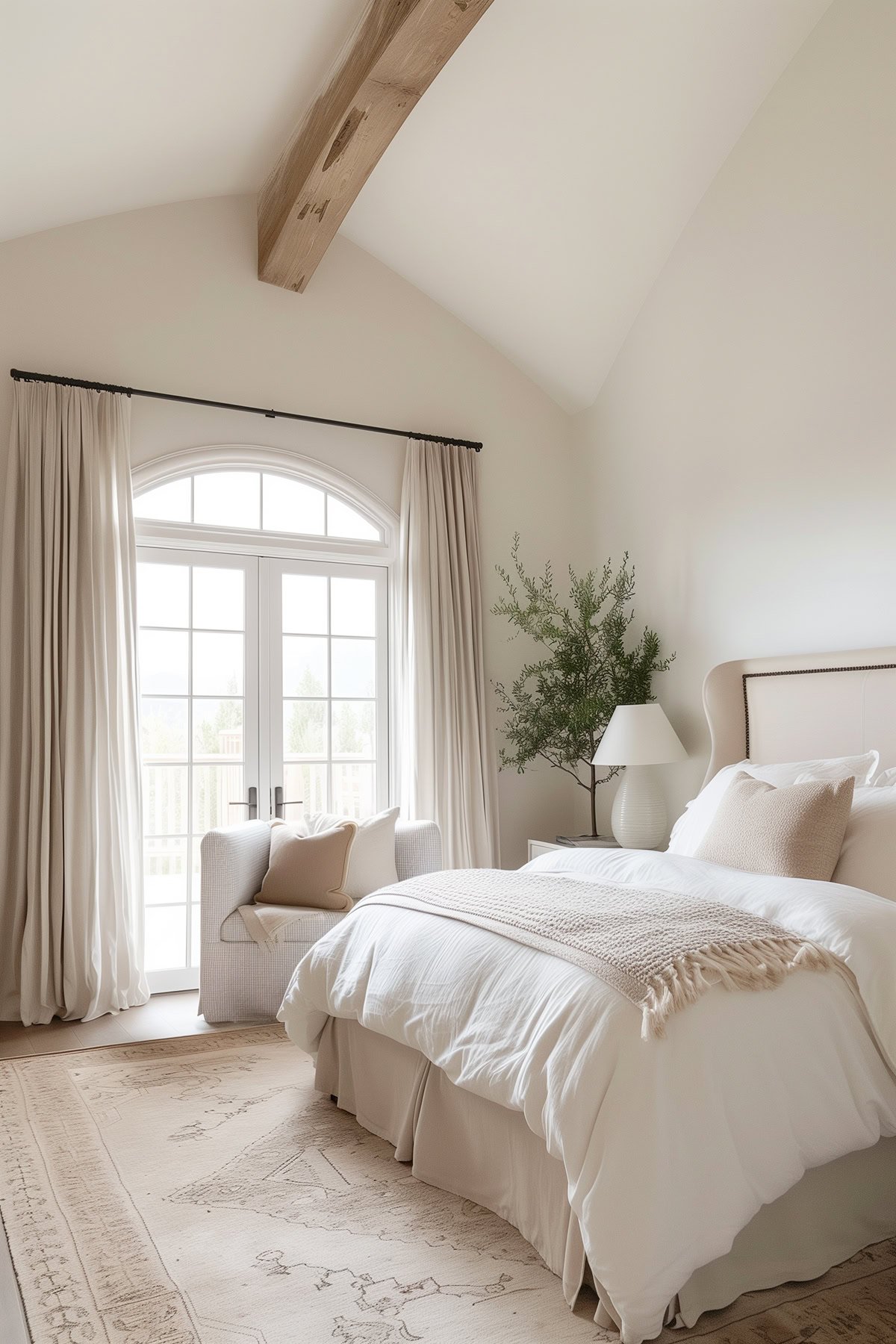
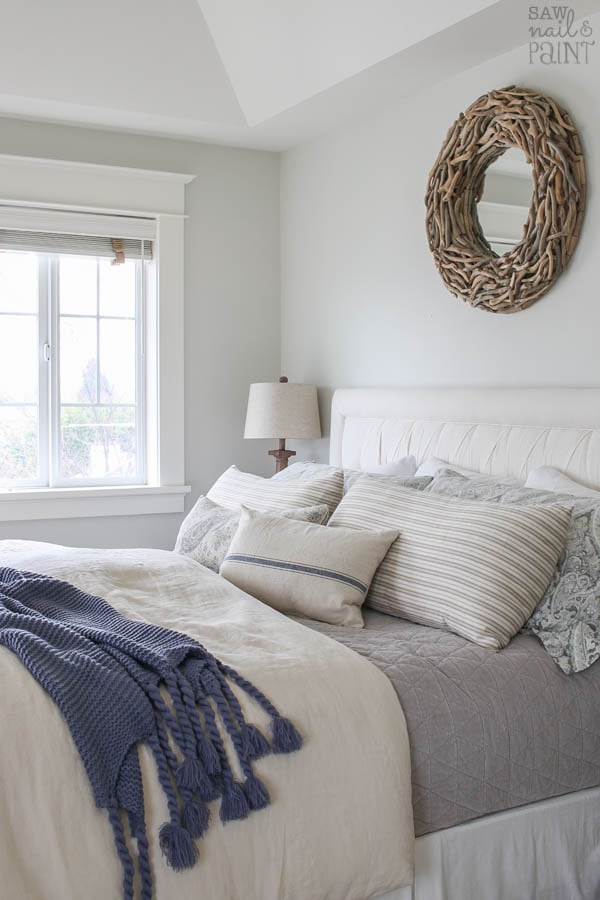
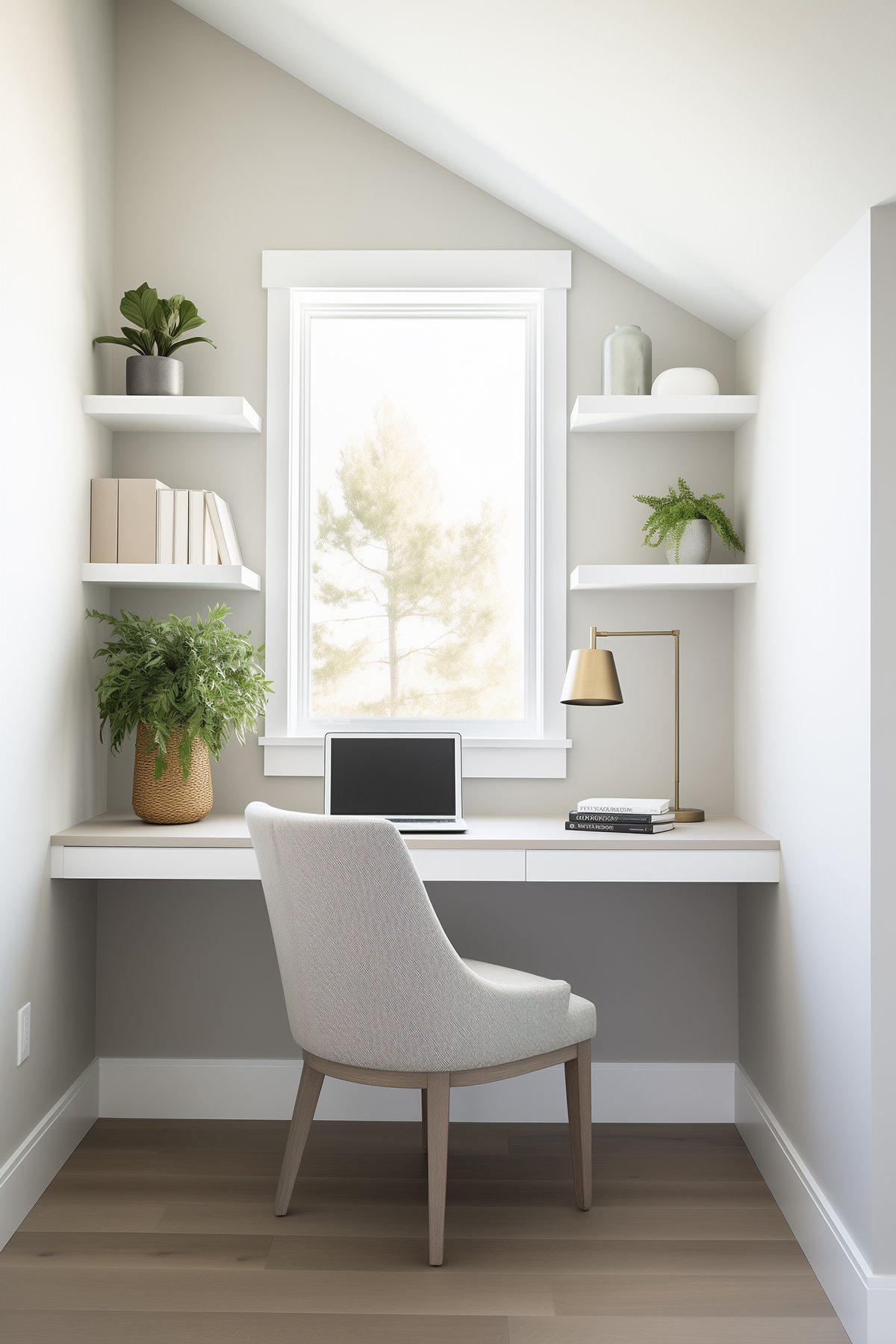
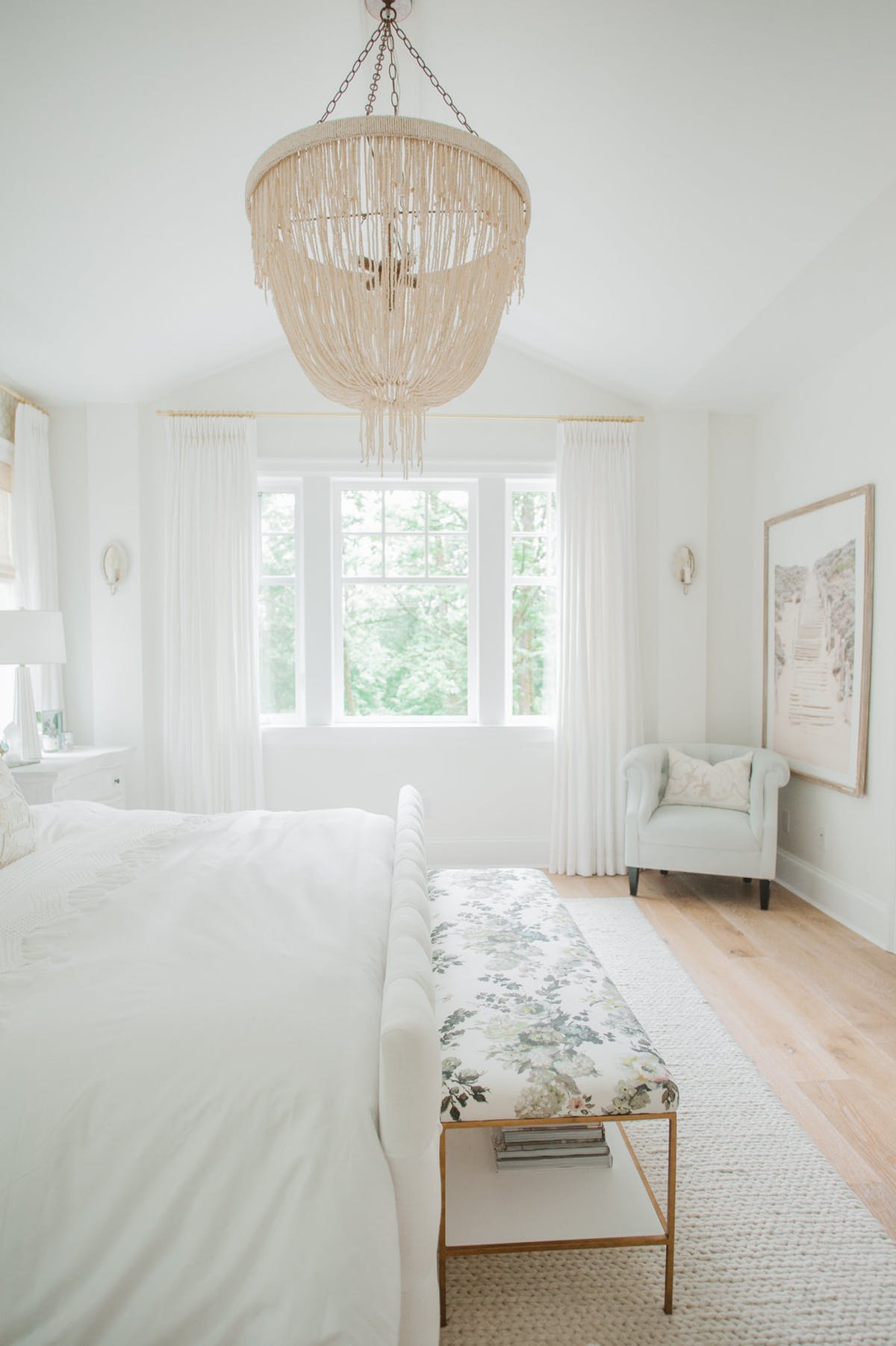
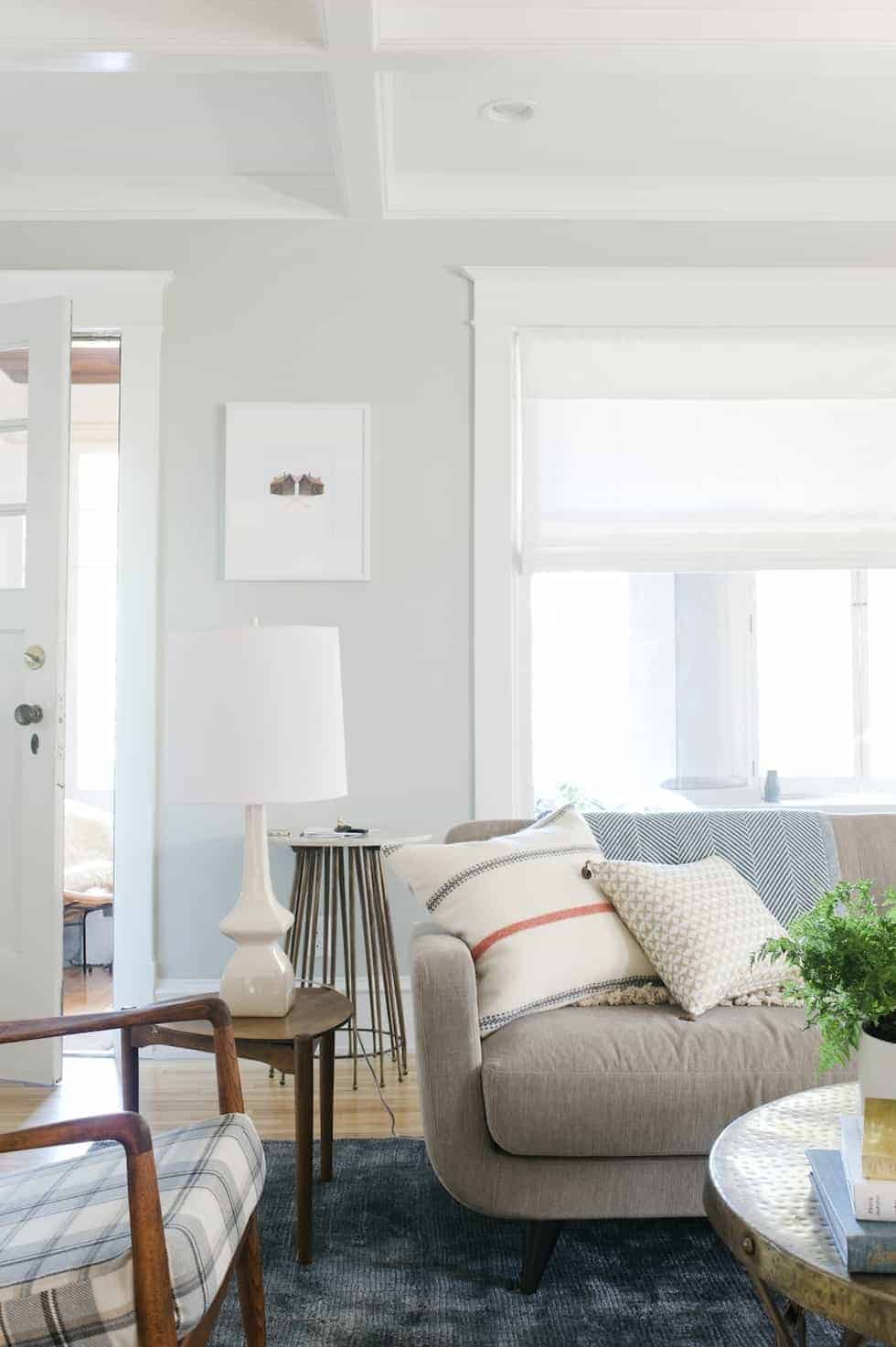
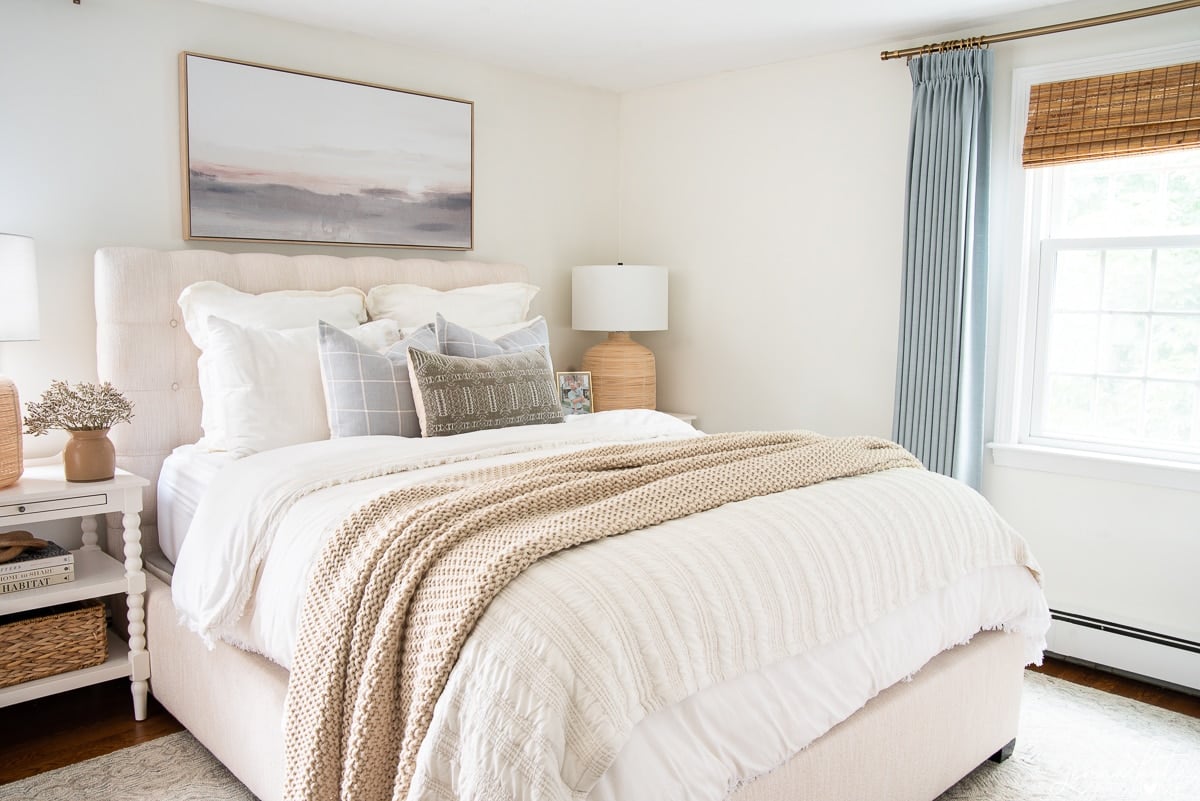
I did Pure White throughout our new build. Walls matte, trim eggshell, also cabs from the factory in P W with a light glaze. We are in the woods of NW WI & I was concerned our white paint picking up the green from our tall pines thru our MANY windows. A SW consultant online suggested it as a way to avoid that. I am so pleased with it! There is no color carryover. It’s clean, white but not shockingly white. Pure White is a win win for me.
I am in the process of having my interior walls, ceilings and doors painted. I was planning on painting everything white using Sherwin Williams Pure White or Extra White. After looking at pictures of white rooms, I’m wondering if I should use a different shade of white for the walls or does it look good to paint everything one shade?
I have chosen pure white as my interior wall color in our new construction house. What color white kitchen aid cabinets from Lowe’s would you recommend using with Pure white kitchen walls? Do white cabinets have to match white walls?
Hello, have been researching SW Pure white for weeks! Found your post most helpful. Planning to do kitchen cabinets in SW Pure white, would the island in BM Wrought iron work? Southern light with lots windows. Would you mind recommending a wall color as well. Would really appreciate any help, I feel like my head is going to explode with all colors choices!
Yes Wrought Iron would have nice contrast! I would pick something light and slightly warm for the walls. You could just do Pure White (which would be beautiful with all the light coming in) or if you want some color, BM Classic Gray, SW Repose Gray (lightened by 50%) something along those lines would be nice. If you go all-white, try to balance that out by adding more warmth with brass hardware or even just rattan or warm wood barstools.
I am in the process of having my new construction house painted. The interior is going to be pure white in satin, I went with extra white gloss for doors and trim. I read your article and now I’m afraid that my pure white will have the dingy look as you said. Will it be that bad? I’ll probably still have time to take the buckets and have them tinted to pure white for my trim and doors??
I would not do pure white and extra white together. Pick one and use it for both walls and trim. With the different sheens, there will be enough contrast that it won’t look like the same color but you won’t have to worry about the undertones.